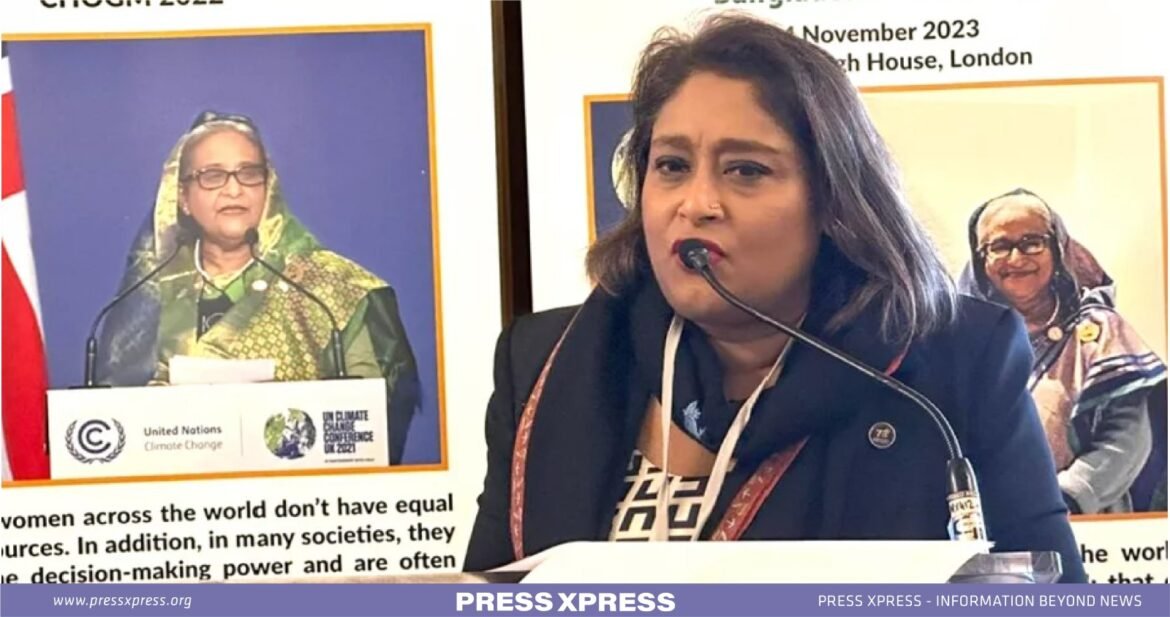Climate change represents an escalating threat not only to public health but specifically to mental well-being. The repercussions of climate change are increasingly evident, with frequent reports of extreme weather events, prolonged droughts, water scarcity, devastating wildfires, and widespread flooding. These events not only impact agriculture and human systems but also have discernible effects on mental health.
A pivotal gathering, the high-level roundtable on ‘Climate Risk and Mental Health: Women’s Voices,’ recently took place at the Commonwealth Secretariat in London. Co-hosted by the Bangladesh High Commission in London, the Commonwealth, and in collaboration with the Shuchna Foundation, this summit underscored the shared commitment of Commonwealth countries to collaborate closely in addressing climate-induced challenges and their deleterious effects on mental health.
You can also read: Saima Wazed Wins as WHO Southeast Asia Director
Saima Wazed, Advisor to the Director General of the World Health Organization (WHO) for Mental Health and Autism, as well as the Thematic Ambassador for the Climate Vulnerable Forum (CVF), delivered a keynote speech at this noteworthy event. During her inaugural address of the Commonwealth NCD Guiding Framework 2023, she drew attention to the mental health landscape and the strides toward universal health coverage in Bangladesh.
Wazed urged for global cooperation with Bangladesh to confront this burgeoning challenge head-on, emphasizing, “Early detection and appropriate management of mental health conditions need to be emphasized through a collective approach and global awareness.” Her remarks underscore the imperative for a collaborative and comprehensive global strategy to address the intersection of climate change and mental health, recognizing the need for early intervention and a united front against the mounting challenges.
Dedicated climate and mental health resilience day
In a groundbreaking recommendation, Saima Wazed, also Regional Director-elect of the WHO South-East Asian Regional Office (SEARO), proposed the establishment of a Climate and Mental Health Resilience Day during the upcoming COP28. This innovative idea marks the first-time integration of health considerations into the framework of COP events.
The concept of a dedicated day for climate and mental health resilience underscores the acknowledgment of the intricate linkages between environmental factors and mental well-being. Such a specialized day offers a unique platform to elevate awareness surrounding the profound impact of climate change on mental health. It represents an invaluable opportunity to educate the public on the psychological consequences of environmental shifts and to champion strategies that foster resilience.
Wazed emphasized the pivotal connection between climate and mental health resilience. She urged Commonwealth nations to bolster collaboration, recognizing the collective challenge of addressing climate-related issues and their cascading effects on mental health. Acknowledging the inherent limitations of individual countries in managing these challenges, she underscored the necessity for joint efforts and heightened global awareness.
The recognition of the intersection between climate and mental health advocates for a holistic approach to health. Addressing both environmental and mental health concerns in tandem enables societies to cultivate a more profound and comprehensive understanding of overall well-being. By championing this integrated perspective, communities can collectively strive for a healthier, more resilient future in the face of the complex challenges posed by climate change.
Bangladesh’s efforts
In the face of escalating climate change impacts on our warming planet, Bangladesh has emerged as a global exemplar, confronting challenges ranging from droughts and floods to sea level rise and storms. While health professionals and organizations in the country grapple with the deteriorating mental health consequences of these changes, Bangladesh has demonstrated remarkable resilience, standing out as one of the most vulnerable countries.
The nation has effectively navigated climate change challenges, fortifying itself against natural disasters and implementing ingenious, locally crafted solutions to enhance agricultural productivity. UK Minister Rebecca Pow MP has praised Bangladesh’s efforts, recognizing its accomplishments in women’s empowerment, girls’ education, and primary healthcare, all achieved under the visionary leadership of Prime Minister Sheikh Hasina.
Commonwealth Secretary-General RT Hon Patricia Scotland KC has underscored Bangladesh’s leadership role in the Dhaka-Kigali Mental Health Compact. She also highlighted the Commonwealth CVF climate prosperity partnership, inaugurated at COP26, acknowledging Bangladesh’s pivotal contributions.
High Commissioner of Bangladesh to the UK, Saida Muna Tasneem, lauded Prime Minister Sheikh Hasina’s global leadership exhibited at COP26. Tasneem, who chaired the event in her capacity as the President of Women in Diplomacy Network, London, also paid homage to the enduring contributions of the Father of the Nation, Bangabandhu Sheikh Mujibur Rahman.
She recalled his honorific recognition of women who were subjected to violence during Bangladesh’s War of Liberation, immortalizing them as War Heroes. Bangladesh’s multifaceted resilience, from climate action to women’s rights, stands as a testament to its unwavering commitment to progress and prosperity.


